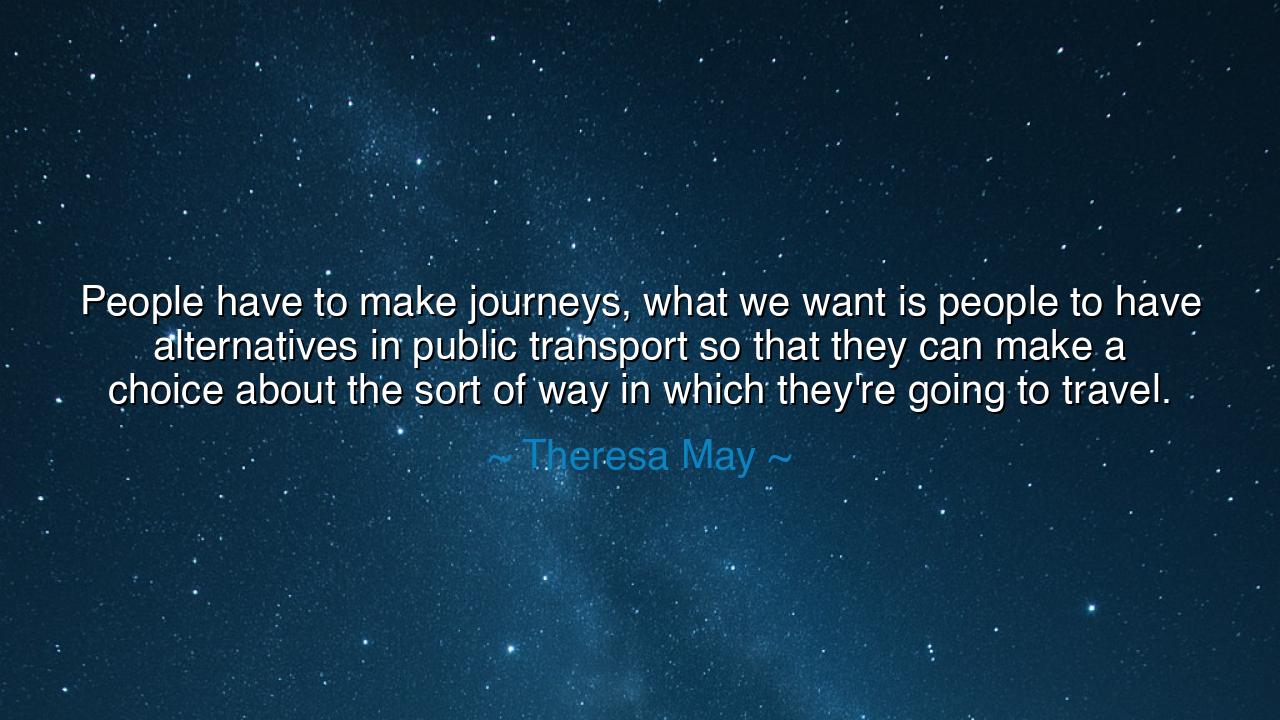
People have to make journeys, what we want is people to have
People have to make journeys, what we want is people to have alternatives in public transport so that they can make a choice about the sort of way in which they're going to travel.






The words of Theresa May, spoken with practical wisdom, carry within them the weight of a universal truth: “People have to make journeys, what we want is people to have alternatives in public transport so that they can make a choice about the sort of way in which they're going to travel.” On the surface, these may appear as the utterances of a stateswoman addressing policy. Yet, in their deeper layers, they resonate with the eternal struggles of humankind: the necessity of movement, the yearning for freedom, and the dignity of having paths open before us rather than chains that bind.
For since the dawn of time, men and women have made journeys. The hunter set forth at dawn, the shepherd moved with his flocks, the pilgrim walked the long road toward the holy shrine. Life itself is a journey: the newborn child begins it with the first breath, and the elder completes it with the final sigh. To journey is to live, to refuse stasis, to accept that movement is woven into the very fabric of human existence. Thus, May’s words remind us that no person escapes this destiny—every soul must move, whether across lands, across tasks, or across the seasons of life itself.
But she also declares that it is not enough merely to move; there must be alternatives, for choice is the breath of freedom. Without choice, journeys become chains, and movement becomes toil. Consider the people of ancient Rome: their empire thrived not only because of their legions but because of their roads—a vast web of stone paths that gave citizens and soldiers alike a thousand ways to reach their destinations. In such infrastructure was born not only efficiency, but liberty, for one could decide which road to take, which town to pass, which course to follow. Rome’s power was built upon this gift of alternatives, for choice gave life to commerce, to culture, and to connection.
We are also reminded of the great Underground Railway of 19th-century America. To enslaved people, choices in travel were denied, their movements chained and controlled. Yet when the secret network of routes was formed, it gave them the most precious of human gifts: the possibility to choose their own journey, to walk a path toward freedom. Those brave men and women who guided and those who fled understood this truth better than most: to be given alternatives in how one may move is to be given dignity, hope, and life itself.
The meaning of the quote, therefore, lies not only in the context of trains and buses, but in the wider philosophy of human existence. To grant people choices in how they travel—whether literally across the earth or figuratively through the story of their lives—is to honor their humanity. Without alternatives, the traveler becomes captive to a single path. But with choices, the traveler becomes sovereign, an agent of their own destiny. Thus, what May calls for in the realm of public transport is in truth a reflection of the greater principle of human liberty.
Yet this truth also carries responsibility. To be given choices is not a license for wastefulness, selfishness, or indifference. Just as the ancients chose their roads wisely—knowing that one might lead to prosperity and another to peril—so must we choose wisely in our own journeys. In the modern age, this may mean choosing the path that lessens harm to the earth, that eases the burdens of others, that honors community over mere convenience. Freedom without wisdom leads to ruin, but freedom with wisdom leads to flourishing.
The lesson, then, is both practical and profound: cultivate choices in your life, and fight for choices for others. Support systems that give people many ways to move—through work, through travel, through the growth of their souls. When you stand at the crossroads of decision, weigh your choices with care, and do not fear to take the road that brings life, dignity, and sustainability. For to live is to journey, and to journey well is to cherish the gift of alternatives. Only then can one truly claim to have traveled not as a captive, but as a free and noble soul.






AAdministratorAdministrator
Welcome, honored guests. Please leave a comment, we will respond soon